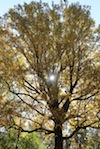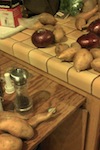 I love to watch
I love to watchas the earth changes its picture
for me
rhubarb emerges
for a moment
an alien brain pushing through the soil
then unfurls
All in Creation Care
 I love to watch
I love to watch We learned after a few days how to keep moving and enjoy the scene at the same time, how to discern which pictures we needed to take and which we could do without, and how to tell stories from home while enjoying alien country. But why did we feel the need amid all that natural beauty to request personal anecdotes or stories about family members back home? Were we merely searching for distraction from blisters, muscle aches, and wheezing lungs?
We learned after a few days how to keep moving and enjoy the scene at the same time, how to discern which pictures we needed to take and which we could do without, and how to tell stories from home while enjoying alien country. But why did we feel the need amid all that natural beauty to request personal anecdotes or stories about family members back home? Were we merely searching for distraction from blisters, muscle aches, and wheezing lungs?  I’m wearing autumn on my heart this year. I empathize with the trees. I walk the neighborhood as I walk my life, looking for clues. I am uncertain. I notice the leaves that are still emerald, and others whose tips are already dipped in warm and bright colors. I witness a slow fade of vermilion and nod yes, me too. Change is coming, but what will the end resemble?
I’m wearing autumn on my heart this year. I empathize with the trees. I walk the neighborhood as I walk my life, looking for clues. I am uncertain. I notice the leaves that are still emerald, and others whose tips are already dipped in warm and bright colors. I witness a slow fade of vermilion and nod yes, me too. Change is coming, but what will the end resemble? As I walked past the line of garbage cans that always posted sentry duty on Sunday nights, I scanned idly for any interesting abandonments — books or furniture whose owner had left them out for neighborhood salvagers to claim. I had learned in my last two years in New York that while the city might be stingy with space, its residents were a bit more laissez-faire with belongings they could no longer use. (In fact, I once heard a five-minute presentation on the best times of the month and neighborhoods to go looking for things.)
As I walked past the line of garbage cans that always posted sentry duty on Sunday nights, I scanned idly for any interesting abandonments — books or furniture whose owner had left them out for neighborhood salvagers to claim. I had learned in my last two years in New York that while the city might be stingy with space, its residents were a bit more laissez-faire with belongings they could no longer use. (In fact, I once heard a five-minute presentation on the best times of the month and neighborhoods to go looking for things.)Pulling English Ivy is back-breaking work. . . . You are sweaty, thirsty, and exhausted. You use words not part of your common vocabulary. You want to scream. You want to give up. You look back at the sailboat rounding the bend, the stars and stripes flapping in the breeze. WHY are we doing this?
 Winter’s slow but resistant recession has begun, and every part of me approves of the transformation. Robins know, too. They sing differently in this air. With more intent, their warbles cascade with less timidity, more gallantly, with greater vigor, more musically sweeping. They know. I listen.
Winter’s slow but resistant recession has begun, and every part of me approves of the transformation. Robins know, too. They sing differently in this air. With more intent, their warbles cascade with less timidity, more gallantly, with greater vigor, more musically sweeping. They know. I listen. I recently had the pleasure of speaking at a college convocation. When I told the Director of Spiritual Life that I would share my creation-care journey and then ask students to work in small groups on a Good Steward Covenant — committing to specific actions they would take in a day, a week, a month, and a year — I could see he was a bit skeptical. No speaker had ever done anything quite like this in a convocation, but he was game.
I recently had the pleasure of speaking at a college convocation. When I told the Director of Spiritual Life that I would share my creation-care journey and then ask students to work in small groups on a Good Steward Covenant — committing to specific actions they would take in a day, a week, a month, and a year — I could see he was a bit skeptical. No speaker had ever done anything quite like this in a convocation, but he was game. Emma Sleeth has left dorm life to move back in with her parents. Though she’s living in the basement, Emma is concerned that her ecological footprint is bigger now than it was at college: “It’s not like I’ve suddenly started throwing Styrofoam in streams or anything. I still recycle, dry my clothes on a rack, and use compact fluorescent lights. We even compost at home, which my cafeteria at college did not do.”
Emma Sleeth has left dorm life to move back in with her parents. Though she’s living in the basement, Emma is concerned that her ecological footprint is bigger now than it was at college: “It’s not like I’ve suddenly started throwing Styrofoam in streams or anything. I still recycle, dry my clothes on a rack, and use compact fluorescent lights. We even compost at home, which my cafeteria at college did not do.” The first year that Jeremy planted his garden, I ruined it. My husband, a self-employed musician, had painstakingly raised tomato plants from tiny seeds bought at our local hardware store. He’d been envisioning a bountiful vegetable garden ever since we moved from our house near downtown Nashville to the smaller rural community of Kingston Springs.
The first year that Jeremy planted his garden, I ruined it. My husband, a self-employed musician, had painstakingly raised tomato plants from tiny seeds bought at our local hardware store. He’d been envisioning a bountiful vegetable garden ever since we moved from our house near downtown Nashville to the smaller rural community of Kingston Springs. We stayed like that, just sitting in the tropical moonlight, for a long time. I couldn’t help but compare the peacefulness of the night air with the busyness of our lives back home. So rarely did we have time to stop and think, to discuss the big questions of life. Our conversation rambled from art and music, to books we were reading, to the state of the world.
We stayed like that, just sitting in the tropical moonlight, for a long time. I couldn’t help but compare the peacefulness of the night air with the busyness of our lives back home. So rarely did we have time to stop and think, to discuss the big questions of life. Our conversation rambled from art and music, to books we were reading, to the state of the world.